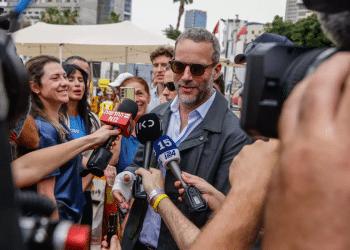Jordan's king appealed Sunday to U.S. Vice President Mike Pence to respect Jerusalem's historical status quo and "rebuild trust and confidence" in the possibility of a two-state solution to the Israeli-Palestinian conflict, following fallout from U.S President Donald Trump's decision to recognize Jerusalem as Israel's capital.
The king was holding talks with visiting U.S. Vice President Mike Pence, who was on the second leg of his Middle East tour. Pence's trip is the highest-level visit by a U.S. official to the region since Trump made his declaration on Jerusalem.
Abdullah voiced concern over the U.S. recognition of Jerusalem as Israel's capital, saying that "Jerusalem is key to Muslims and Christians, as it is to Jews. It is key to peace in the region and key to enabling Muslims to effectively fight some of our root causes of radicalization."
Jordan insists that east Jerusalem be the capital of a future Palestinian state, the king said.
He then called on the U.S. to respect relevant U.N. resolutions and Arab peace initiatives regarding the settlement of the Israel-Palestinian conflict.
Pence tried to reassure the monarch that the U.S. was committed to restarting peace efforts and to a two-state solution, should both sides agree. Such a caveat deviates from long-standing U.S. support for that approach as the only possible outcome of any peace deal.
Pence also told the king Washington was committed to preserving the status quo of holy sites in Jerusalem.
Trump's announcement on Jerusalem last month infuriated Palestinians, who seek the eastern part of the city as a future capital. They accused the U.S. of siding with Israel and said Washington can no longer serve as a mediator.
The declaration also posed a dilemma for Abdullah, a staunch U.S. ally who derives his political legitimacy in large part from the Hashemite dynasty's role as guardian of the Al-Aqsa Mosque, a key Muslim site in Jerusalem. Any perceived threat to Muslim claims in the city is seen as a challenge to Jordan, where a large segment of the population is of Palestinian origin.
Jordanians worry the move to recognize Jerusalem as Israel's capital could trigger violence in the Palestinian territories which could spill over into Jordan, where many people are descendants of Palestinian refugees whose families left after Israel was created in 1948.
Another cause of concern for Jordan is the Trump administration's decision to move the U.S. Embassy in Israel from Tel Aviv to Jerusalem. Jordan vehemently opposes such a move if taken ahead of an Israeli-Palestinian partition deal.
While Israel views Jerusalem as its unified capital, an international consensus has long held that the city's final status should be decided through negotiations, which was also U.S. policy going back decades.
Pence told the king that the U.S. has committed "to continue to respect Jordan's role as the custodian of holy sites, that we take no position on boundaries and final status." It was a message Pence relayed Saturday in talks with Egypt's president.
Later, after meeting U.S. troops near the Syrian border, Pence said he and Abdullah had "a very frank discussion.
"Look, friends occasionally have disagreements and we agreed to disagree on the decision by the United States to recognize Jerusalem as the capital of Israel. But what we agreed on was the need for all parties to come back to the table," Pence said.
"The Palestinian Authority has been absent from direct negotiations since 2014. And I hope I impressed upon King Abdullah our earnest desire to restart the peace process," Pence said.
Abdullah expressed concerns about the regional fallout from the Jerusalem decision. He said Jordan viewed the Israel-Palestinian conflict as a "potential major source of instability."
We hope that the U.S. will reach out and find the right way to move forward in these "challenging circumstances," the king said.
"Today we have a major challenge to overcome, especially with some of the rising frustrations," he said.
In addition to Jerusalem's status, Abdullah also expressed concern over the recent U.S. decision to cut funding to the U.N. agency that aids Palestinians, UNRWA, saying the move could prove catastrophic for millions of people in need.
The pair also exchanged views on counterterrorism in the region and the situation in Syria.
After their meeting, Pence flew to a military facility near the Syrian border to meet with U.S. troops.
Pence was scheduled to hold meetings on Monday with Prime Minister Benjamin Netanyahu, deliver an address to the Knesset and visit the Yad Vashem Holocaust Memorial.




